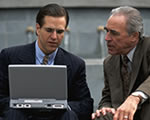 Go to main content
Go to main content
Archive Website of the UK government
Please note that this website has a UK government accesskeys system.
Main menu
Page menu
Government, citizens and rights

The role and work of Members of Parliament (MPs)

The public elects MPs to represent their interests and concerns in the House of Commons. MPs are involved in considering and proposing new laws, and can use their position to ask government ministers questions about current issues.
The work of an MP
MPs split their time between working in Parliament itself, working in the constituency that elected them, and working for their political party. Some MPs from the ruling party become government ministers with specific responsibilities in certain areas, such as health or defence.
When Parliament is sitting (meeting), MPs generally spend their time working in the House of Commons. This can include raising issues affecting their constituents, attending debates and voting on new laws. Most MPs are also members of committees, which look at issues in detail, from government policy and new laws to wider topics like human rights.
In their constituency, MPs often hold surgeries in their office, where local people can discuss any matters that concern them, although there are limits to the help MPs can give. MPs also attend functions, visit schools and businesses and generally try to meet as many people as possible. This gives MPs further insight and context into issues they may discuss when they return to Westminster.
Contacting your MP and how they can help
MPs can help you if your concern is something that Parliament or central government is responsible for. For example, your concern could relate to the NHS, HM Revenue and Customs, or the Department for Work and Pensions which deals with benefits, pensions and National Insurance.
It is best to contact a local councillor or a representative in a devolved Assembly if your concern is about things like Council Tax, local social services and day-to-day problems in schools.
You can contact your MP by:
- writing a letter (House of Commons, London SW1A 0AA)
- meeting them at a surgery in your local constituency (surgeries are advertised in local newspapers and public libraries, and are usually for many people)
Use the link below to find out more about your MP, and to see whether they have an email address or a website.
The House of Commons Information Office has a factsheet called 'You and your MP' with more information about how your MP can help you.
MPs and select committees
A select committee is a small group of MPs who deal with a particular area of work.
Select committees look at policy and administration across the main government departments and their associated public bodies, and also look at specific European legislative proposals. They are also appointed for particular tasks: to investigate specific issues or particular Bills, for example.
They report their conclusions and recommendations to the House of Commons. A select committee may be appointed for a Parliament, or for a session, or for as long as it takes to complete a task. Each committee is constituted on the basis of party strength in the House.
In their examination of government policies, expenditure and administration, select committees may question ministers, civil servants, interested bodies and individuals. Through hearings and published reports, they bring before Parliament and the public an extensive amount of fact and informed opinion on many issues.
MPs' rights and privileges
To ensure that Parliament can carry out its duties, MPs have certain rights and immunities. These include:
- freedom of speech
- the rights of the House to control its own proceedings (so that it can, for instance, keep out 'strangers' if it wishes)
- the right to decide on legal disqualifications for membership and to declare a seat vacant on such grounds
- the right to punish for breach of its privileges and for contempt
Parliament has the right to punish anybody, inside or outside the House, who commits a breach of privilege — that is, who offends against the rights of the House.
To find out about the safeguards in place to ensure the integrity of MPs, see 'Standards in public life'.
 Facebook
Facebook Twitter
Twitter StumbleUpon
StumbleUpon Delicious
Delicious Reddit
Reddit

